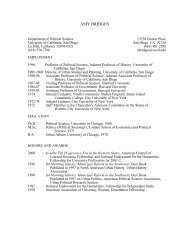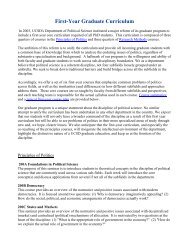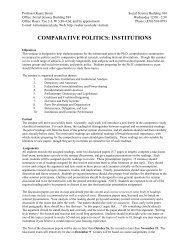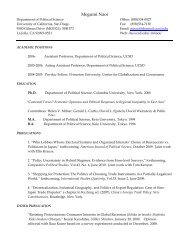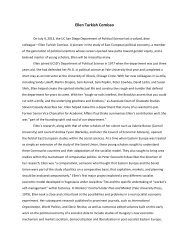Contemporary Sociology Theory - Department of Political Science
Contemporary Sociology Theory - Department of Political Science
Contemporary Sociology Theory - Department of Political Science
Create successful ePaper yourself
Turn your PDF publications into a flip-book with our unique Google optimized e-Paper software.
Companion to Habermas; and Richard J. Bernstein, ed., Habermas<br />
and Modernity.<br />
Habermas’ Philosophical Discourse <strong>of</strong> Modernity is a set <strong>of</strong><br />
lectures that attacks a whole series <strong>of</strong> developments in French<br />
thought, including the work <strong>of</strong> Foucault. On this issue, see<br />
Foucault contra Habermas: Recasting the Dialogue between<br />
Genealogy and Critical <strong>Theory</strong>, ed. by Samantha Ashenden and David<br />
Owen; Michael Allen, ed., Critique and Power: Recasting the<br />
Foucault-Habermas Debate, and Noelle McAfee, Habermas, Kristeva,<br />
and Citizenship.<br />
STRUCTURALISM AND POST-STRUCTURALISM<br />
On structuralism, see now the fascinating work by François<br />
Dosse, History <strong>of</strong> Structuralism, 2 volumes. Also Jean Piaget,<br />
Structuralism, who, among other things, criticizes Foucault.<br />
Richard Harland, Super-structuralism is quite interesting,<br />
although at times obscure. On structuralism in literary<br />
analysis, see Roland Barthes, Writing Degree Zero, Jonathan<br />
Culler, Structuralist Poetics, and Frederic Jameson, The Prison-<br />
House <strong>of</strong> Language. On anthropology, see Simon Clarke, The<br />
Foundations <strong>of</strong> Structuralism, Claude Levi-Strauss, Structural<br />
Anthropology, Edmund Leach, Claude Levi-Strauss, and Marcel<br />
Henaff, Claude Levi-Strauss.<br />
Vincent Descombes, Modern French Philosophy, is a brief but<br />
entertaining overview <strong>of</strong> recent French thinkers. Luc Ferry and<br />
Alain Renaut, French Philosophy <strong>of</strong> the Sixties, is a conservative<br />
and rather simple critique <strong>of</strong> the same thinkers. Jürgen Habermas<br />
provides a trenchant critique <strong>of</strong> the “Nietzschean current” in<br />
France in his The Philosophical Discourse <strong>of</strong> Modernity, with<br />
chapters on Foucault and Derrida, among others. Martin Jay,<br />
Downcast Eyes: The Denigration <strong>of</strong> Vision in Twentieth-Century<br />
French Thought, is an unusual and ingenious investigation <strong>of</strong><br />
recent French thought from the point <strong>of</strong> view <strong>of</strong> its “antiocularcentric”<br />
attitude toward “seeing”.<br />
Mark Poster, Critical <strong>Theory</strong> and Post-structuralism, is a<br />
defense <strong>of</strong> recent trends in postmodernism. Other works covering<br />
similar developments are Charles Lemert, French <strong>Sociology</strong> since<br />
1968; Scott Lash, <strong>Sociology</strong> <strong>of</strong> Postmodernism; Nancy Fraser,<br />
Unruly Practices; Allan Megill, Prophets <strong>of</strong> Extremity; John<br />
Fekete, ed., The Structural Allegory: Reconstructive Encounters<br />
with the New French Thought; and Peter Dews, Logics <strong>of</strong><br />
Disintegration. See also Jerrold Seigel, “La mort du sujet:<br />
origines d’un thème,” in DEBAT 58 (January-February 1990): 160-<br />
169.<br />
6




